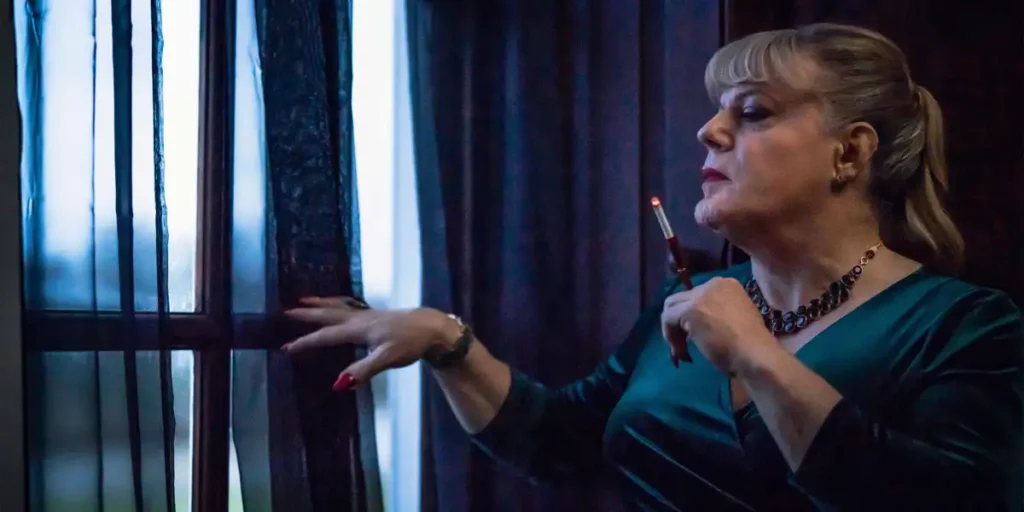Joe Stephenson’s Doctor Jekyll has its moments of fun but doesn’t excite as an adaptation of the cult classic as much as one would hope.
With a ‘Hammer’ horror film, there inevitably come certain expectations. And while Joe Stephenson’s Doctor Jekyll certainly leans in to the campy, pulpy and kooky nature of the studio’s famous gothic horror fare, it doesn’t seem inclined to worry about scares. It’s much more interested in the psychological story, adapted – by Dan Kelly-Mulhern – from Robert Louis Stevenson’s novella ‘Strange Case of Dr. Jekyll & Mr. Hyde’ and given a few modern twists. Unfortunately, however, this adaptation is a bit too bland to be that exciting, and a bit too silly to be that memorable.
Down-on-his-luck Rob (Scott Chambers) is desperate for work, and turns up at the stately home of reclusive pharmaceutical big-wig Dr. Nina Jekyll (Eddie Izzard) with the hope of becoming her assistant. But Rob soon finds that there is more to Nina’s mysterious condition and memory lapses than meets the eye, especially when her penchant for strange, green-glowing cigarettes manifests in the form of Rachel Hyde, Nina’s malevolent alter-ego.
As with any adaptation of Stevenson’s classic, it’s important to get the titular ‘duo’ right. Izzard’s Nina Jekyll is calm and sombre, whereas Rachel Hyde is violent and sneaky. Izzard does a good job of balancing the line between the two, and her performance doesn’t ever tip over into being hammy (if you’ll pardon the pun). Chambers is convincingly authentic as Rob, and the interplay between the two is perhaps the film’s biggest strength. And it’s a testament to Izzard’s signature style of humour that lines like “crunchy nutty cornflakes” and “careful of the dead people” feel wry rather than ridiculous, with Izzard’s delivery feeling as delightfully louche as some of her best stand up.
Aside from a blink-and-you’ll-miss-it reference in a newspaper headline proclaiming Nina as a ‘trans CEO’, there’s very little attention paid to the gender swap of Doctor Jekyll. With Jekyll/Hyde being a transitional character by its very nature, elaborating more on Nina’s transness feels like an obvious avenue to explore, but one that Stephenson and Kelly-Mulhern studiously avoid. It’s a thematic aspect of the film that would require a delicate balance, with the potential to be either very effective or horrendously tone-deaf, and so perhaps avoiding it was the right call here. But it also feels like a misstep, particularly in regards to its success as an adaptation, because there’s little else that’s particularly different or interesting about this version outside of that. Especially considering the fact that the film doesn’t seem keen to explore the themes of classism or id vs. ego very much either.
Despite being trimmed down to a mere 89 minutes, Doctor Jekyll drags throughout its middle act, and one can’t help but wonder if the wrong stuff was cut. More thematic exploration and less irrelevant melodrama would have saved it from feeling bogged down, even if things do go delightfully bananas for the final fifteen minutes or so. Stephenson sets things up nicely, and Blair Mowat’s score is fun and delightfully unconcerned with subtlety, but it is a shame that the film can’t sustain that entertainment level continuously.
Doctor Jekyll certainly has its moments of being as campy, pulpy and kooky as a Hammer horror should be, but the film lets itself down with its narrative choices. For a story that feels ripe for a modern interpretation – the less said about Russell Crowe’s appearance in Alex Kurtzman’s The Mummy the better –, Stephenson’s film feels a little too bland to offer anything new. And that’s a real shame, because there is definitely fun to be had here, it’s just not very memorable.
Doctor Jekyll will be available on Digital Download in the UK from 11 March, 2024.

